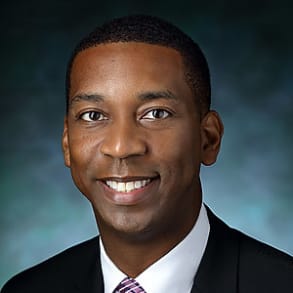Thoracic surgeon Errol Bush discusses the use of extra-corporeal membrane oxygenation (ECMO) to support patients diagnosed with COVID-19 at Johns Hopkins.
mhm Echo has been utilized at multiple centers around the country and in the world and offering life saving measures for refractory lung failure when patients fail optimal medical therapy, even very sophisticated ventilatory management at a place like Hopkins here, ECMO has been a game changer in providing his life saving measures. ECMO, extracorporeal membrane oxygenation treats patients with lung failures by allowing time for the body to respond to the to the insult to in this particular case, the coronavirus Onda helped to clear that infection. Sometimes that can take a matter of weeks, the months before the virus, and it's and the effects are really cleared and the patient may need additional time in order to be able. Thio allow that process to naturally happen. We can also offer additional therapies like steroids or antiviral medications, and particularly here at Johns Hopkins. We have multiple clinical trials that allow new experimental and investigational agents that may help thio reduce the risk, reduce the effect of the coronavirus on the on the body. In addition to those therapies when seemingly all else has failed and the body just needs time to rest, were able to deploy ECMO or extracorporeal membrane oxygenation as an advanced therapy that will take over the bodies. Normal lung function, traditionally when we deploy ECMO, utilize two different blood vessels, primarily the femoral vein and sometimes the internal jugular vein. By doing so, that may impede patient's recovery because they end up not being able to emulate or to participate in physical therapy as much as we would we would like for them to. So we have innovative technology available here at Johns Hopkins, where a dual Lumen cannula can be utilized in the right internal jugular vein on Lee. The way that this cannula works is that blood is aspirated from both E. The I V C and the SBC is aspirated through this blue channel to the ECMO machine, which then removed CO two and provides oxygen to the blood before it is returned through the red port back into the right atrium of the heart. Because this Kenya is much more efficient in providing the normal lung function of removing CO two and supplying oxygen, we believe that it helps patients recovery, but it also gives them much better support during their critical illness. And once they're normal, lung function has recovered from the illness and covert. We've seen that this can take weeks to months before they have full recovery. But we're able to then win the ECMO system such that they can no longer need this advanced form of life support and then Consoli be weaned from the ventilator and proceed with their recovery. Our multidisciplinary ECMO program is designed with one thing in mind that is to obtain expertise from everyone around here at Hopkins. Many of my colleagues are world experts, not just regional but truly international thought leaders in offering expertise. So we utilize the expertise of our critical care docks, our brain doctors or north critical care intensive ist surgeons, pulmonary doctors on this, practitioners physician assistants, respiratory therapist. Everybody has a stake in helping the patients on ECMO. When you before a patient to us for ECMO or consideration for ECMO, the screening process really involves not just one mind, but multiple bright minds to make sure that therapy is the right therapy and we don't miss an opportunity to save the patient's life. ECMO has been around for decades and cardiac surgeons armamentarium and offering help for patients who are in dire need for various reasons, research and innovative efforts has not been quite as robust in the animal world and export research. I think when Cova 19, as unfortunate as it may be for all of us, pushes the envelope in the technology, it gives us a good opportunity to come together as an academic mind and understanding the technology better. Hopefully, this will translate into new therapy new ways to provide ECMO in saving patients, lives who have other conditions of heart and lung failure.



